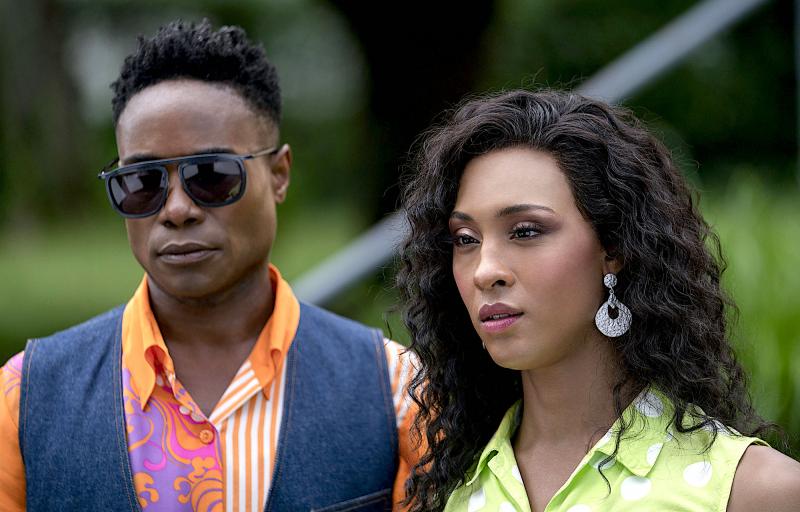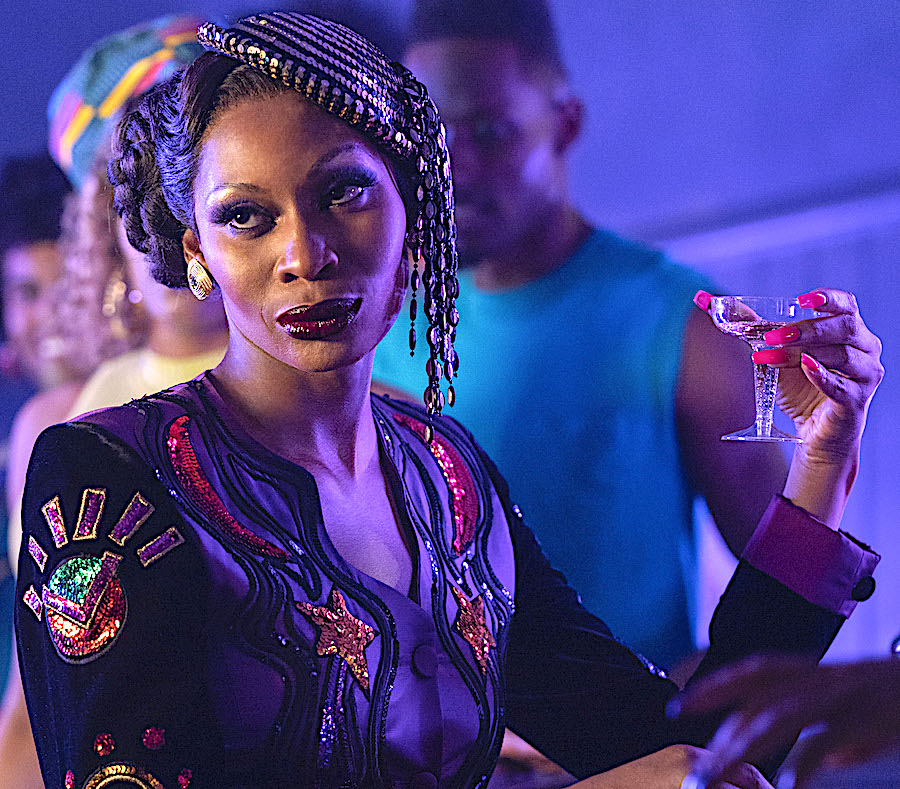Pose, Series 2, BBC Two review - satisfying return for one of TV's most triumphant dramas | reviews, news & interviews
Pose, Series 2, BBC Two review - satisfying return for one of TV's most triumphant dramas
Pose, Series 2, BBC Two review - satisfying return for one of TV's most triumphant dramas
Ryan Murphy’s excellent series about 1980s ball culture is getting grimmer, but it’s still a whole lot of fun

Pose offers something that is really rare in the TV world: it’s a show that manages to be both darkly sombre and completely uplifting.
The first series was intoxicating. It was fast-moving, beautifully shot, and more camp than the Met Gala. It introduced us to a sprawling cast of talented trans actors. It told a nuanced and harrowing story about the love and loss of a community torn apart by HIV. Pose’s second series, premiering on BBC Two, looks like it will be as warm, as sad, and as excellent as the first.
This series begins on a very dark note. Blanca (MJ Rodriguez) and Pray Tell (Billy Porter) visit the unmarked grave of Pray’s ex, who has died with HIV in his mid-twenties. Soon after, Blanca learns that her own condition has worsened, and her diagnosis is reclassified as AIDS. Angel (Indya Moore) enters a modelling competition in a bid to get out of sex work, and Pray attends his first ACT UP rally. He then marshals everyone to a protest. These sober scenes play out to a soundtrack of Madonna — “Vogue” is the hit of the summer and, as the Nineties commence, there are glimmers of hope for greater community acceptance. And despite all the dark content, there are still glamorous costumes and bitchy takedowns and all the big-hearted fun for which the show is best known. Pose continues to be anchored by its actors’ moving performances and its characters’ utter likeability. As Pray, Porter amps up the politics while exhibiting the same empathy and panache he displayed in the first series. As Angel, Moore steals many scenes, with their unfair combination of being easy to root for as well as mesmerisingly beautiful.
Pose continues to be anchored by its actors’ moving performances and its characters’ utter likeability. As Pray, Porter amps up the politics while exhibiting the same empathy and panache he displayed in the first series. As Angel, Moore steals many scenes, with their unfair combination of being easy to root for as well as mesmerisingly beautiful.
There was one slightly stilted moment — an outburst by Elektra (Dominique Jackson, pictured above), who has been given one of the most erratic character arcs. But moments like these remind us that Pose dares to celebrate things that are often maligned by mainstream culture. One of those things is melodrama. Elektra brings it with force, and is a foil to the show’s simpler, more serious moments.
Something about this season feels even fresher than the first. Absent is last series’ focus on suburbia, which contributed to its Mad Men-like quality. But this absence is not a bad thing. With this second series, and with a third in the works, Pose is developing a striking and singular identity — it is getting harder to describe it through reference to any other show. Here’s hoping that this series continues to celebrate that distinctiveness. Pose is an electrifying, unstinting representation of a community coming out of the shadows. Tonight’s return was a pleasure to watch.
The future of Arts Journalism
You can stop theartsdesk.com closing!
We urgently need financing to survive. Our fundraising drive has thus far raised £49,000 but we need to reach £100,000 or we will be forced to close. Please contribute here: https://gofund.me/c3f6033d
And if you can forward this information to anyone who might assist, we’d be grateful.

Subscribe to theartsdesk.com
Thank you for continuing to read our work on theartsdesk.com. For unlimited access to every article in its entirety, including our archive of more than 15,000 pieces, we're asking for £5 per month or £40 per year. We feel it's a very good deal, and hope you do too.
To take a subscription now simply click here.
And if you're looking for that extra gift for a friend or family member, why not treat them to a theartsdesk.com gift subscription?
more TV
 Blu-ray: The Sweeney - Series One
Influential and entertaining 1970s police drama, handsomely restored
Blu-ray: The Sweeney - Series One
Influential and entertaining 1970s police drama, handsomely restored
 I Fought the Law, ITVX review - how an 800-year-old law was challenged and changed
Sheridan Smith's raw performance dominates ITV's new docudrama about injustice
I Fought the Law, ITVX review - how an 800-year-old law was challenged and changed
Sheridan Smith's raw performance dominates ITV's new docudrama about injustice
 The Paper, Sky Max review - a spinoff of the US Office worth waiting 20 years for
Perfectly judged recycling of the original's key elements, with a star turn at its heart
The Paper, Sky Max review - a spinoff of the US Office worth waiting 20 years for
Perfectly judged recycling of the original's key elements, with a star turn at its heart
 The Guest, BBC One review - be careful what you wish for
A terrific Eve Myles stars in addictive Welsh mystery
The Guest, BBC One review - be careful what you wish for
A terrific Eve Myles stars in addictive Welsh mystery
 theartsdesk Q&A: Suranne Jones on 'Hostage', power pants and politics
The star and producer talks about taking on the role of Prime Minister, wearing high heels and living in the public eye
theartsdesk Q&A: Suranne Jones on 'Hostage', power pants and politics
The star and producer talks about taking on the role of Prime Minister, wearing high heels and living in the public eye
 King & Conqueror, BBC One review - not many kicks in 1066
Turgid medieval drama leaves viewers in the dark
King & Conqueror, BBC One review - not many kicks in 1066
Turgid medieval drama leaves viewers in the dark
 Hostage, Netflix review - entente not-too-cordiale
Suranne Jones and Julie Delpy cross swords in confused political drama
Hostage, Netflix review - entente not-too-cordiale
Suranne Jones and Julie Delpy cross swords in confused political drama
 In Flight, Channel 4 review - drugs, thugs and Bulgarian gangsters
Katherine Kelly's flight attendant is battling a sea of troubles
In Flight, Channel 4 review - drugs, thugs and Bulgarian gangsters
Katherine Kelly's flight attendant is battling a sea of troubles
 Alien: Earth, Disney+ review - was this interstellar journey really necessary?
Noah Hawley's lavish sci-fi series brings Ridley Scott's monster back home
Alien: Earth, Disney+ review - was this interstellar journey really necessary?
Noah Hawley's lavish sci-fi series brings Ridley Scott's monster back home
 The Count of Monte Cristo, U&Drama review - silly telly for the silly season
Umpteenth incarnation of the Alexandre Dumas novel is no better than it should be
The Count of Monte Cristo, U&Drama review - silly telly for the silly season
Umpteenth incarnation of the Alexandre Dumas novel is no better than it should be
 The Narrow Road to the Deep North, BBC One review - love, death and hell on the Burma railway
Richard Flanagan's prize-winning novel becomes a gruelling TV series
The Narrow Road to the Deep North, BBC One review - love, death and hell on the Burma railway
Richard Flanagan's prize-winning novel becomes a gruelling TV series
 The Waterfront, Netflix review - fish, drugs and rock'n'roll
Kevin Williamson's Carolinas crime saga makes addictive viewing
The Waterfront, Netflix review - fish, drugs and rock'n'roll
Kevin Williamson's Carolinas crime saga makes addictive viewing

Add comment